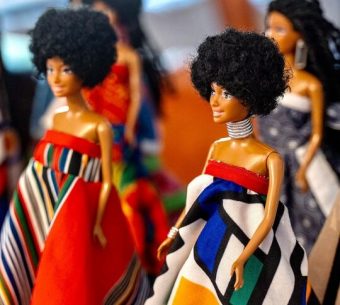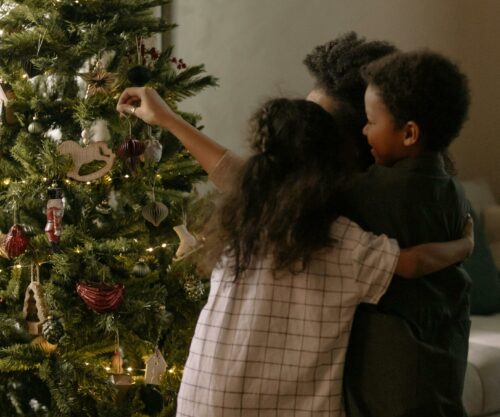
Nandikwa Dolls, owned by Mmule Ramothibe Ka-Pityana, was only an idea in 2012. After launching in 2016, Mmule chose to uphold the diversity and ethnicity of Africa at large by rebranding this niche.
Establishing Nandikwa Dolls
When Mmule’s daughter wanted a Barbie doll at the age of six, Mmule discovered the lack of accessibility to ethnic dolls. ‘To my surprise, we found that there were no enough ethnic dolls to choose from in toy shops. The few dolls termed “African dolls” in retail stores were very distasteful to the eye. I wouldn’t buy it for myself, let alone my daughter.’ Cultural representation and diversity had not been present nor constant in this market. Thus, with young minds being as vulnerable as they are, it became a priority for Mmule to give her daughter access to dolls who represented people like her. Reinforced and conformed by Western culture, Mmule says ‘even in townships, culture is not as prevalent as it used to be growing up. We have allowed the Western way of living to dominate us.’ However, in the predominantly-known Barbie doll era and industry, Mmule was determined to become a shapeshifter. And for this reason, as the well-known saying goes ‘if you do not like something, change it’ – Mmule did exactly that. In April 2016, she released her first doll online, which was followed by many others.
Influence
Though Mmule was not personally influenced by dolls or toys when she was younger, she shares a definitive influence that has impacted her. After witnessing her mother make stuffed toys for NGOs, Mmule says both her parents’ entrepreneurial spirits and her mother’s creativity helped shape and groom her entrepreneurial choices today. Mmule adds that she gravitates towards the renowned Oprah Winfrey, who has played a significant role in her life today, as an international role model. Despite struggles and hardships, one tragedy after the other, Mmule says Oprah has still managed to become a global anchor. And in addition to this, she persevered to ensure young African children become educated. In this way, similar to her role model, Mmule’s aim for Nandikwa was to see young African minds become educated through her brand. This included the attraction of the tourism industry, diaspora market and parents – irrespective of colour; Mmule wanted to keep the children engaged and learning while playing.

Breaking the Market
Although Nandikwa Dolls are accessible right now, the market is still narrow – similar to prior years. Mmule comments, ‘contrary to the belief, this market is still not as accessible. There are still not as many ethnic doll entrepreneurs in South Africa. The few who started fell by the wayside.’ Mmule says that with the exorbitant and luxurious existing products, African people are unable to meet the asking price due to it being very costly, which adds to the reasoning for many dolls not being manufactured in Africa. However, despite the challenges being faced in the market, Nandikwa Dolls has been able to push through as a loved brand. ‘We make what we have work for us,’ says Mmule. From natural and braided hair to traditional garments with enriched designs, these dolls are truly representative of the African peoples.
Design
Looking at the design and process behind Nandikwa Dolls, the first steps begin with the respective traditional prints selection. This gets picked out by Mmule while she works on practical designs. ‘The dolls are small in stature and not ball joints, which makes design very challenging as we cannot use just any type of design on them’ – making the process slightly more intricate and tedious. The outsourcing of Nandikwa Dolls garments goes to Des Creations – a proudly woman-owned factory in Alrode, while a team of ladies braid and manicure the dolls’ hair, packaging them in time for shipments. With the entire collection being assembled in Africa, Mmule says this adds to the authenticity of Nandikwa Dolls, and that she could never choose a favourite; she adores them all. ‘It’s like asking a mom, of her four children, which one is her favourite – it is hard to choose. I love them all.’
Being in her sixth year with Nandikwa Dolls, which initially started out with one doll – missioning to balance the finances – Mmule now owns a range with 10 dolls. Having tradition and culture hold predominant importance in young minds forms a huge part of their upbringing. Thus, the Nandikwa brand not only highlights ethnic dolls, but dolls that portray this tradition and culture. Mmule lists the 10 doll range in no particular order: ‘Kemotswana – Tswana Doll; Mmalesotho – Sotho Doll; Munaka – Va-Venda Doll; Nyeleti – Va-Tsonga Doll; Nandi – Zulu Doll; Ndileka – Xhosa Doll; Temaswati – Swati Doll; Motlalepule – Pedi Doll; Nomhlekhabo – Ndebele Doll and Ayesha – Muslim Doll’. Each doll is listed with her unique name, and shares a story. ‘A story of triumph, tenacity, ambition, grit, perseverance, dignity, and pride. Our dolls are all educated. They are from humble beginnings and are overcomers,’ she says. To mark Heritage Month, Mmule adds that she will be adding and packaging a collection of short stories to celebrate the lives and stories of their dolls.
Lesson
Mmule says the biggest lessons she has learnt from her entrepreneurial journey have been the 3 Ps. ‘Patience, perseverance and passion will get you far. You will always have challenges as an entrepreneur. Challenges will come and go. It is how you deal with these challenges that defines you in the process. Know your why, the rest will sort itself out.’ And alongside this, a sentence that has been keeping her motivated is ‘it always seems impossible until it is accomplished; keep going.’ Like any other business leader, owner, and entrepreneur, Mmule’s wishes for her business is to become unwavering and constant. She lists her goals for the future of Nandikwa Dolls: ‘Introduce a doll with a more voluptuous figure, form dolls with different skin tones, upgrade designs, bring more fabulosity, style and finesse but still maintain our African prints, a Nandikwa Dolls cartoon series – broadcasted in Africa and across the globe, partner with different stakeholders in the ‘I can, I will’ movement developed to stimulate a girl child through the Nandikwa brand storytelling, and add a Nandikwa superhero version to our collection.’ Mmule is reaching for the stars with Nandikwa Dolls, and this does not only include having superheroes for boys or girls.
Although the market might not be at its peak just yet, Mmule is striving for change. In closing, Mmule says ‘there is always light at the end of the tunnel, but always carry a torch. By torch I mean, be informed; stay motivated; get knowledge and apply it.’ And when doing this, ‘don’t despair and feel sorry for yourself. Be a victor and not a victim. Turn your pain into purpose. If you fall – which you will – get up, dust yourself off, keep your chin up and keep going because such is life.’




